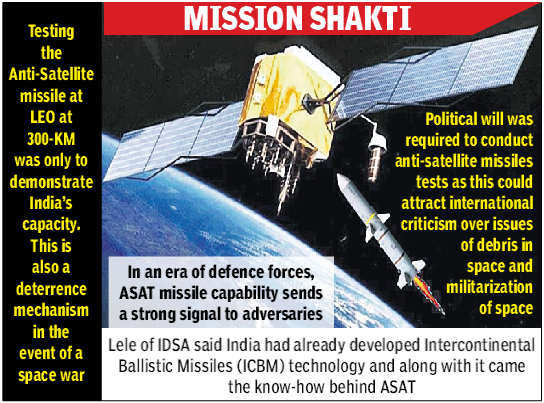New Delhi: The anti-satellite missile capability demonstrated by India Wednesday will be a deterrent in the event of a war where space may be the theatre of action with countries seeking to down enemy satellites, experts explained.
“The message goes strong and loud that if any of our satellites is harmed, we possess the capability of destroying yours (the adversary),” said Ajay Lele, senior fellow with the Institute for Defence Studies and Analyses.
India shot down one of its satellites in space with an anti-satellite missile Wednesday, Prime Minister Narendra Modi said, hailing the country’s first test of such technology as a major breakthrough that establishes it as a space power. India would only be the fourth country to have used such an anti-satellite weapon after the US, Russia and China, said Modi, who heads into general elections next month.
Experts said India has possessed the anti-missile technology for several years but needed the political go-ahead to test it in live conditions. They said the DRDO received the green signal to prepare for the test two years ago.
In 2012, India conducted simulated tests, establishing the capability but the then Manmohan Singh-led UPA government had not given permission for a live test.
Daniel Porras, Space Security Fellow, United Nations Institute for Disarmament Research, Geneva, said Wednesday’s test destroyed a satellite at an altitude of 300 km.
“It was not a good sign for LEO (low earth orbit)… which has telecommunication and earth observation satellites and also the International Space Station”, which cruises at a height of 400 km, he said.
“The test was done at 300 km, so pretty low, meaning most of the debris will slowly come down. However, lots of objects near that altitude… Not a good sign for all those LEO constellations. Also, if any debris damages other objects, India will be liable under the Liability Convention (if attribution is established),” Porras tweeted.
Former ISRO chairperson G Madhavan Nair, who was secretary, Department of Space, from 2003 to 2009, said the DRDO had anti-missile technology, including the algorithms required for setting the trajectory to hit the moving target.
“Marrying the two technologies (of ISRO and DRDO) was required which happened over the last few years,” Nair told reporters.
Prime Minister Narendra Modi Wednesday announced that the test, named Mission Shakti, was not directed against any country and the disused Indian owned satellite was a pre-determined target.
In an address to the nation, Modi also said India has not breached any international law or treaty. India is only the fourth country to acquire such a specialised and modern capability after the US, Russia and China. There has been no instance of a space war but the countries have demonstrated their capabilities by testing on their own satellites, like India did Wednesday.
The UNIDIR defines ASAT (Anti-Satellite) as “any capabilities aimed at destroying or disabling space assets for any reason, whether military or civilian, offensive or defensive”.
Rajeshwari Pillai Rajagopalan, senior fellow and head of the Nuclear and Space Initiative, Observer Researcher Foundation (ORF), said Wednesday’s development reflects India’s desire to not make the mistake it did in 1974 when it conducted its first nuclear test in Pokhran.
